Do you ever wake up with neck pain or feel like your pillow just doesn’t support you? I’ve been there, and it can really affect your sleep.
Finding the right pillow size is more important than you might think. If the pillow dimensions aren’t right for your body or sleeping style, you’ll end up uncomfortable and restless. If you’re after a bed pillow, travel pillow, or decorative throw, getting the size right is key.
When you understand pillow dimensions, it’s easier to choose the one that will support your neck and help you sleep better. The right pillow size could be the secret to a peaceful night’s sleep!
Understanding Pillow Dimensions
Pillow dimensions refer to the length and width measurements that determine how much space your pillow covers. These measurements matter because they affect how well your pillow supports your head and neck alignment.
A pillow that’s too small won’t provide enough surface area for comfortable resting throughout the night. One that’s too large might not fit properly on your bed or inside your pillowcase.
The right size helps maintain proper spine alignment and prevents stiffness when you wake up.
Pillow dimensions vary depending on where you live, as standards differ across the U.S., U.K., and Europe. Even within the same country, different brands sometimes use slightly different measurements for their pillows.
Different Types of Pillows and Their Dimensions
I’ve found that knowing the exact dimensions of different pillow types helps you make better buying decisions. Here’s what you need to know about each common pillow size:
1. Standard Pillow
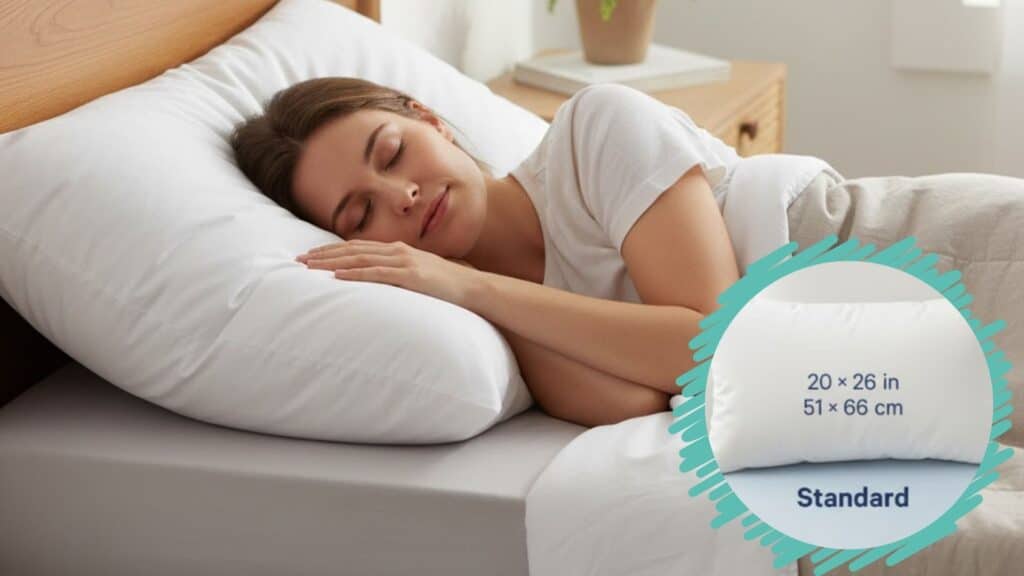
Standard pillows measure 20 inches by 26 inches, making them the most common size available everywhere.
They work perfectly on twin or full beds where space is more limited than larger options. This size suits single sleepers who don’t move around too much during the night comfortably.
However, standard pillows look small and out of place on king-sized beds visually. They’re budget-friendly and easy to find pillowcases in any store you visit regularly.
2. Queen Pillow
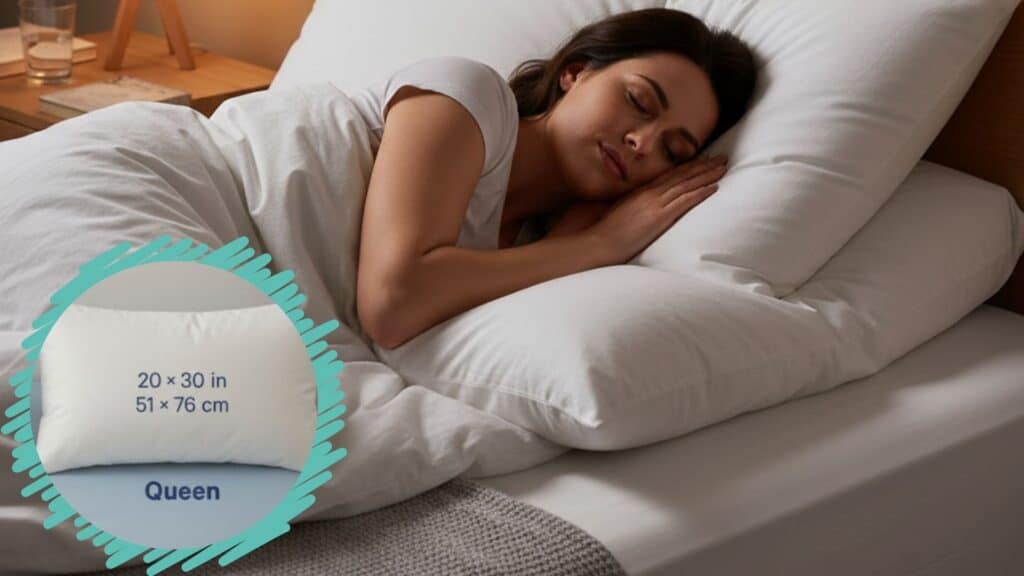
Queen pillows measure 20 inches by 30 inches, giving you four extra inches compared to standard. This added length provides more room to shift positions without your head falling off the edge.
They fit nicely on twin, full, or queen beds without overwhelming the mattress space available. The extra surface area makes them popular among restless sleepers who change positions frequently at night.
Queen pillows offer a nice middle ground between standard and king sizes for versatility and comfort.
3. King Pillow
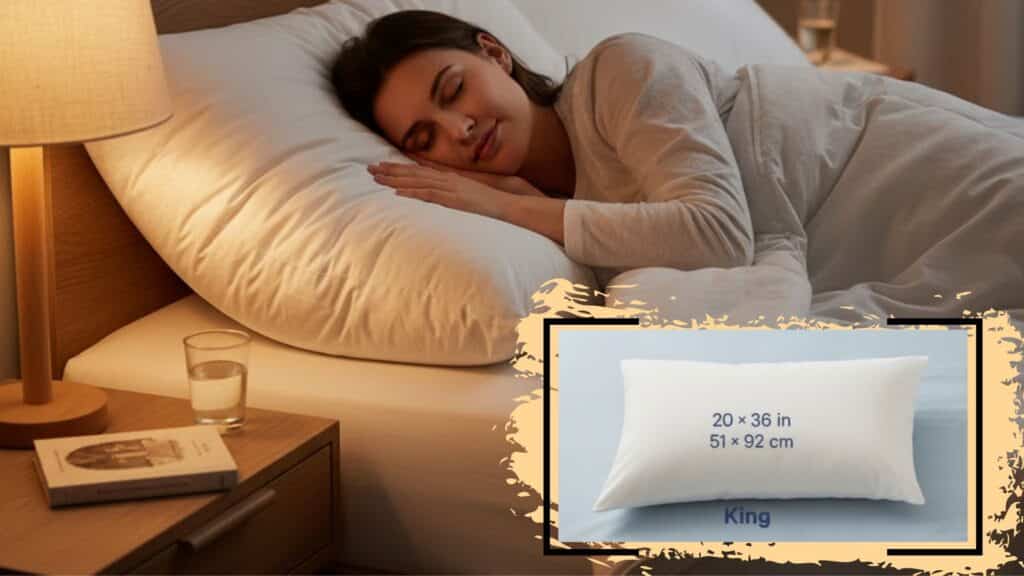
King pillows measure 20 inches by 36 inches, making them the longest rectangular pillow option sold. They’re designed specifically for king beds, where two of them span the width perfectly together.
Side sleepers benefit from the extended length because it supports their entire head and neck. Some people use king pillows as body pillow substitutes since they’re long and supportive.
These pillows provide maximum sleeping surface but require larger pillowcases that cost slightly more money.
4. Euro Pillow

Euro pillows are square-shaped, typically measuring 26 inches by 26 inches on all sides evenly. They’re used mainly for decorative purposes and propped against headboards in stylish layered arrangements.
Hotels and luxury bedding setups frequently feature Euro pillows for an elegant, polished appearance overall. You can also use them for back support while sitting up, reading, or watching television.
Their square shape makes them stand out visually from traditional rectangular sleeping pillows available everywhere.
5. Body Pillow
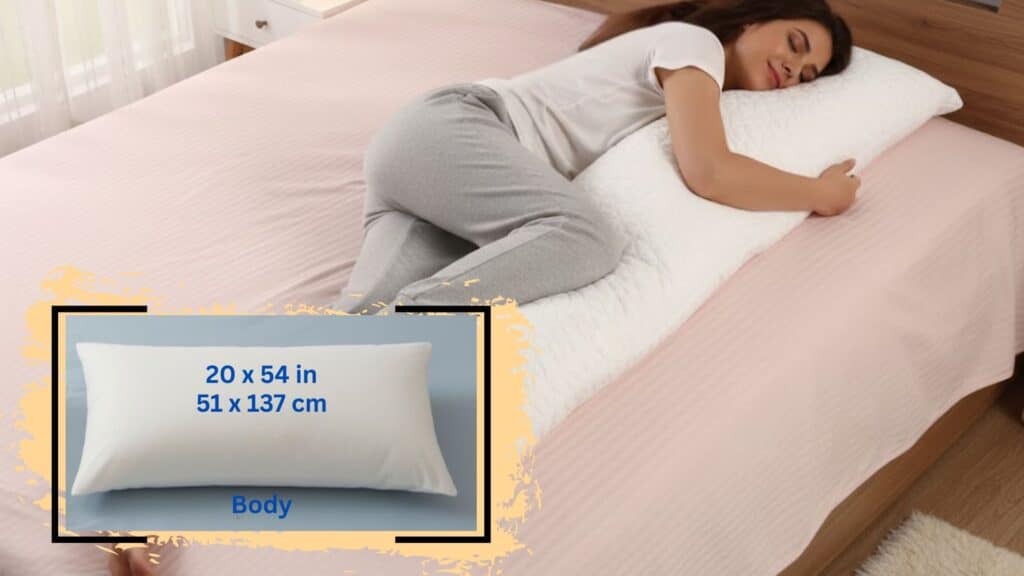
Body pillows are extra long, usually measuring 20 inches by 54 inches for full-body support. They’re specially designed for side sleepers who want something to hug and align their spine.
Pregnant women love body pillows because they support the belly and significantly reduce back strain.
The extended length lets you position the pillow between your knees for better hip alignment. Body pillows help reduce pressure points and keep your spine in a neutral position all night.
Specialty Pillow Dimensions
When choosing the right specialty pillow, size is key. You want one that fits your specific needs and comfort. Here are some dimensions to keep in mind:
- Travel Pillow: Usually measures 12″ x 16″; perfect for providing neck support during flights or road trips.
- Toddler Pillow: Typically around 13″ x 18″; designed to fit small cribs and offer gentle support for your little one.
- Baby Pillow: Usually 12″ x 16″; small enough to ensure comfort without overwhelming your baby’s tender neck.
- Decorative Throw Pillow: Available in 18″ x 18″ or 20″ x 20″; great for adding style to beds, couches, or chairs.
I hope these dimensions help you find the perfect pillow for your needs. If you’re looking for more pillow ideas, I’ve got plenty of options to explore!
Standard Pillow Sizes Chart
I’ve created a simple chart that shows all the common pillow sizes in one place. Here’s a quick reference guide to help you choose the right pillow for your bed:
| Pillow Type | Dimensions (inches) | Dimensions (cm) | Ideal Mattress Size | Common Use |
|---|---|---|---|---|
| Standard | 20 x 26 | 51 x 66 | Twin, Full | Single sleepers, a budget-friendly option |
| Queen | 20 x 30 | 51 x 76 | Twin, Full, Queen | All-around sleeping, more room to move |
| King | 20 x 36 | 51 x 91 | King, California King | Side sleepers, king beds, body pillow substitute |
| Euro | 26 x 26 | 66 x 66 | Any size | For decorative purposes, a back support when sitting |
| Body | 20 x 54 | 51 x 137 | Any size | Side sleepers, pregnancy support, full-body alignment |
Keep in mind that measurements can vary slightly between brands and manufacturers. Always check the exact dimensions listed on the product label before making your final purchase.
How to Choose the Right Pillow Size?
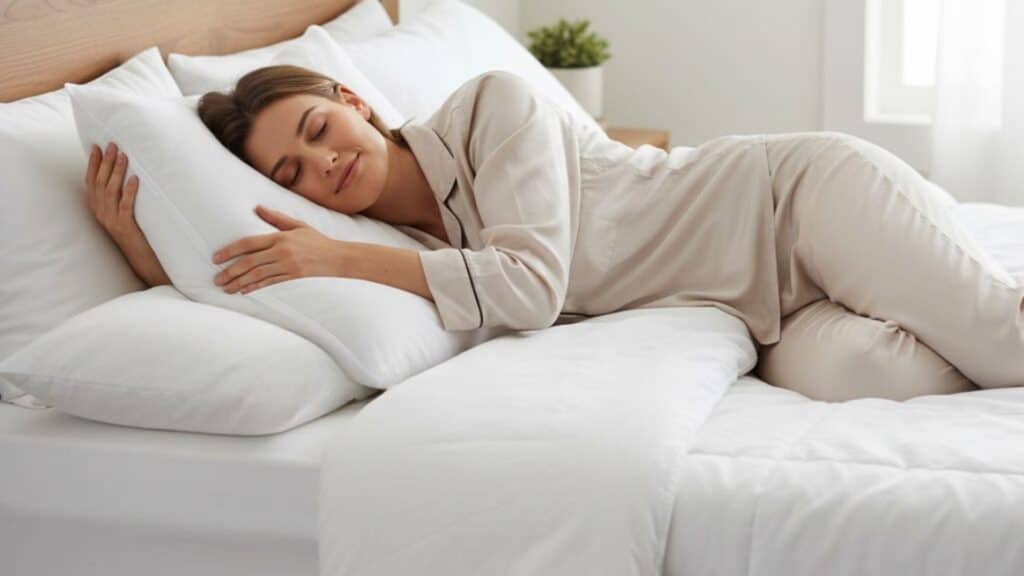
Choosing the right pillow size starts with understanding how you sleep each night. Side sleepers need longer pillows, like a king-size pillow, to support their entire head and neck properly.
Back sleepers do well with queen or standard sizes that keep their spine aligned correctly. Stomach sleepers should pick thinner, smaller pillows to avoid straining their neck at awkward angles.
Think about how many pillows look balanced on your bed without creating visual clutter everywhere. Two king pillows fit perfectly across a king bed, while two queens suit smaller mattresses.
Test pillow size by lying down in your usual sleeping position before buying anything new. Your head should rest comfortably without hanging off the edge or feeling cramped.
Regional Pillow Size Differences to Consider
Pillow sizes can differ depending on where you are. In the U.S., a standard pillow typically measures 20 x 26 inches.
In the U.K., standard pillows are usually 19 x 29 inches, making them a bit longer than the U.S. version.
Over in Europe, pillow sizes are often measured in centimeters, with the most common size being 50 x 75 cm, or roughly 19.7 x 29.5 inches.
If you’re shopping internationally, it’s important to know how pillow sizes convert. For example, 1 inch equals 2.54 cm.
Knowing this can help ensure your pillowcases fit correctly, no matter where you buy them. Always double-check the sizes!
Common Mistakes to Avoid When Buying Pillows
Many people make simple errors when shopping for pillows that lead to discomfort and wasted money. Here are the most common mistakes you should avoid:
- Buying oversized pillows that don’t fit standard pillowcases forces you to buy expensive specialty covers later.
- Ignoring how pillow size affects neck and spine alignment can lead to morning stiffness and pain.
- Overstuffing your bed with too many decorative pillows that you have to remove every single night.
- Choosing a pillow size based only on looks without testing if it actually supports your sleeping position comfortably.
Avoiding these mistakes saves you money and helps you sleep better from the very first night. Take time to evaluate your actual needs instead of impulsively buying pillows that look appealing.
That’s a Wrap
Understanding pillow dimensions is key to improving your sleep quality. When you pick the right size, your neck and spine will be properly supported, helping you wake up feeling refreshed.
I’ve found that testing out different sizes is a great way to figure out what works best for you. Don’t settle for a pillow that’s too big or too small; your sleep is worth it.
I always recommend trying a few options before making your decision. Now that you know more about pillow dimensions, choose the right one for better rest. Have a favorite pillow size? Comment below and share your thoughts!









